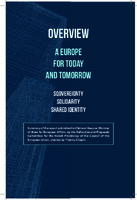Overview A Europe for today and tomorrow SQovereignty Solidarity Shared identity

report
Συγγραφέας
Committee for the French Presidency of the European Union
Chopin, Thierry
Ημερομηνία
2022-01Προβολή/
Θεματικές επικεφαλίδες
European Affairs ; Social aspect ; Strategic independence ; Potential resourcesΠερίληψη
The French Presidency of the Council of the European Union (hereinafter
referred to as the “PFUE”) began on 1 January 2022. As part of prepara-
tions for this event, the Minister of State for European Affairs, Clément
Beaune, wanted to start a Reflection and Proposals Committee for the
PFUE in order to set out broad guidelines for the upcoming presidency.
The outcome of the committee’s work (independent, gender balanced and
comprising academics and experts of varied backgrounds and nation-
alities) was published in a report submitted to the Minister of State on
30 November 2021. The information below aims to present this report by
summarizing its main themes for reflection and proposals.
The committee met regularly between March and October 2021. Each
meeting was based around the presentation of a thematic note drawn up
by two or three committee members and a discussion with all group mem-
bers. Furthermore, over 50 figures from outside the committee were called
on as part of this mission.
Four main ideas can be identified among the committee’s many reflec-
tions. Firstly, the need to respond to uncertainties and concerns, whether
they be economic and social (fear of individual loss of status), geopolitical
(fear of collective decline) or regarding identity (who are we?). Next, the
importance of increased solidarity between Member States of the Euro-
pean Union, as we saw in the context of the recent health crisis. Similarly,
the committee focused on dealing with European issues based on a mul-
ti-scale approach which is not limited to a Europe of institutions or States
but which also deals with more local, or conversely, more international lev-
els. Finally, it also emerged that a renewal of the French method seemed
desirable, with the idea of showing more humility without, however, reject-
ing ambitious progress. The French vision, the essence of which is not nec-
essarily being challenged, is nonetheless viewed quite warily by European
partners, which suspect France of perceiving the EU as a way to push its
model onto them. Efforts could thus be made in terms of education and
terminology to address this issue.
In order to provide an insight which, while moving beyond traditional insti-
tutional frameworks, could be useful for preparing the PFUE, the commit-
tee members chose a three-pronged model for their discussions, drawn
up in the French authorities’ programme around the concepts of “Recov-
ery”, “Strength” and “A Sense of Belonging”. But beyond that, this agenda
was broadened to include analysis of the perceptions and expectations of
this French Presidency in other Member States; and to examine how to
more firmly establish a European dimension within France, whose public
opinion is one of the most critical of the European Union.
Αριθμός σελίδων
21p.Γλώσσα
ΑγγλικάΓαλλικά
